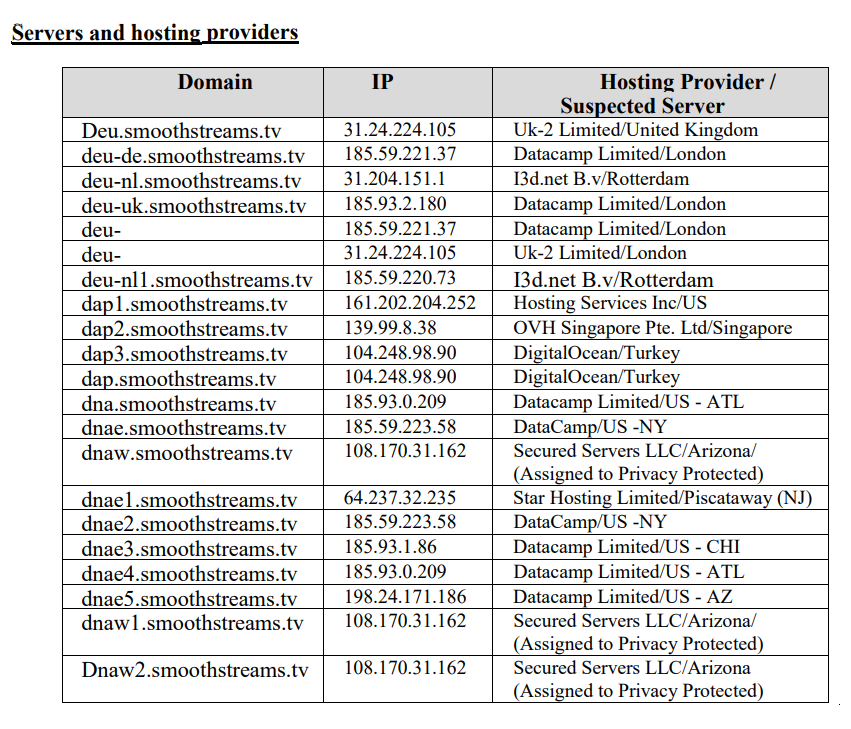-
chevron_right
MPA v. SmoothStreams IPTV: Server Photos & Shutdown Details Emerge
news.movim.eu / TorrentFreak · Tuesday, 13 December, 2022 - 19:51 · 6 minutes
 When users of popular IPTV provider SmoothStreams.tv began reporting issues with the service mid-July, few could’ve predicted events to follow.
When users of popular IPTV provider SmoothStreams.tv began reporting issues with the service mid-July, few could’ve predicted events to follow.
Our previous report covers events in finer detail, but essentially SmoothStreams had been under investigation since 2018 and the time had arrived to take it down.
With permission from the court and everything planned down to the finest detail, on July 16, 2022, plaintiffs’ representatives, independent court-appointed supervising solicitors, private investigators, and sundry others set out to secure vital evidence .
Since SmoothStreams’ alleged operator lives in Canada, local companies Bell Media and Rogers Media naturally lead the list of plaintiffs in the underlying lawsuit. Beyond that, it’s the familiar cascade of MPA/MPA-Canada members Columbia, Disney, Paramount, Universal, and Warner. Netflix is a notable absentee and all except Rogers Media are MPA and/or ACE members.
Execution of Interim Order
On June 17, 2022, around a month before alleged SmoothStreams operators Marshall Macciacchera and Antonio Macciacchera were targeted in person, the plaintiffs filed a statement of claim detailing their copyright infringement allegations.
Following an ex parte motion at the Federal Court, on June 28 Justice Vanessa Rochester granted an Interim Order consisting of an interim injunction against the defendants, an Anton Piller order authorizing zero-warning searches and evidence seizures, plus other ancillary orders.
Since Anton Piller orders and controversy are rarely far apart, the plaintiffs were required to pay a deposit of CAD$100,000 (US$73,100), recoverable once lawful execution of the Interim Order had been confirmed.
Plaintiffs Demand More
The Interim Order was served on the defendants on July 14 and on July 19, the plaintiffs sought a declaration that their execution was lawful and filed a request for the return of their deposit.
Since execution was allegedly complicated by the defendants, the plaintiffs sought additional relief, including an order charging Marshall with contempt of court and an order compelling the defendants to reveal the identity of a mysterious third-party involved in SmoothStreams’ operations.
The defendants’ motion in opposition was supported by video footage documenting the execution of the order. It was taken by the plaintiffs’ videographer who works as a private detective. Further support came from a transcript of the defendants’ cross-examination of Daniel Drapeau, a court-appointed supervising solicitor.
Drapeau is a leading authority on Anton Piller orders, he was involved in the TVAddons case and has pressed Canada’s government on numerous piracy-related issues , including statutory damages and anti-camming legislation. He’s certainly no stranger to cases like these.
Based on all available evidence, Federal Court Judge Roger R. Lafreniѐre had to decide whether to grant or deny the entertainment industry giants’ motion.
More Shutdown Operation Details Emerge
On the day of the raid, Drapeau was accompanied by a computer forensics expert and yet another private investigator.
Execution at one of the locations began at 08:00 on July 14 and ended 34 hours later at 00:47 on July 16. Hardware found at one of the addresses (below) was allegedly used to supply IPTV content to SmoothStreams (SSTV) users.
Court documents reveal that their purpose was confirmed when Marshall shut down two servers. An investigator viewing SmoothStreams from a remote location noticed that channels including Fight Network and WWE Network behaved differently compared to the night before the operation. As a result, the hardware was seized.
Marshall also had his PC mirrored after Drapeau “observed that it contained financial documents” but SmoothStreams’ alleged operator refused to supply the password. Four hard drives were also seized when Marshall could not provide the passwords to those either.
Whether they held anything vitally important is unclear, but taking them back to base would have been straightforward using the most compact of cars. When the interim order was executed at a second address during the evening of July 14, it wasn’t a question of whether a truck should be called in, but how many.
Second Address, Massive Haul
Court documents reveal that the execution of the order involved the following:
a. The disconnection and removal of multiple television receivers that were receiving (or “capturing”) television content that was being redistributed on the SSTV Services;
b. The disconnection and removal of multiple servers that were connected to those receivers and responsible for transferring the content received by the television receivers to the SSTV Services;
c. The removal of additional receivers, encoders and servers located on the premises but not connected at the time of the execution;
d. The identification, review and copying of documents found on the premises;
e. Requesting information from Marshall on topics listed in the Interim Order.
The main server room at the second location contained nine large server cabinets with at least 65 television receivers connected to 23 servers. Over the years many images of IPTV server rooms have been published by the authorities but none like this.
A further 23 television receivers, five additional servers, and 29 encoders were also seized. Some of the servers were running WMS Panel for source/stream management and on one a user was logged in. ‘Sam’ is the mystery person the plaintiffs are still trying to identify.
Third Address: Access Denied
Even with an Anton Piller order in hand, execution excludes the use of force. Instead, defendants are advised that failing to comply could be considered contempt of court, with potentially serious consequences.
Antonio Macciacchera’s approach to cooperation failed to meet the court’s expectations. He answered the door when the team arrived and was apparently served, but that’s where progress ended.
When another independent solicitor tried to explain the situation to him, Antonio refused to read or even look at the paperwork, and then repeatedly interrupted the solicitor before calling a lawyer, court documents state.
When he returned, everyone was told to leave his property, which they did. Subsequent telephone conversations came to nothing and execution was aborted.
Defendants’ Objections Rejected
Judge Roger R. Lafreniѐre’s analysis is both detailed and lengthy, but in summary, the defendants failed to convince him that the execution of the order was unlawful.
Claims that health and safety precautions were not adhered to were dismissed, despite the general chaos of the pandemic. Those executing the order (or attempting to) passed antigen tests the previous day, wore N95 masks, and maintained physical distancing. Other allegations failed to match recorded evidence or were dismissed by the Judge for various reasons.
“Based on the evidence before me, which is not challenged by the Defendants, I find that the execution of the Interim Order directly corroborates and bolsters the evidence presented at the ex parte motion before Justice Rochester,” the Judge’s order reads.
Declaring the execution of the Interim Order as “lawfully conducted”, the movie and TV company plaintiffs were granted leave to withdraw their deposit. The defendants were reminded that running any similar service is prohibited by court order, and were told to hand over information related to various accounts, domains and servers.
The Judge’s order also requires full disclosure of all assets, no matter where in the world they’re located, related to the running of SSTV and/or similar platforms. Bank accounts, safety deposit boxes, investment accounts, cryptocurrency, and other “financial instruments” must all be declared.
The defendants cannot sell their homes, dispose of any other assets, exchange any assets for foreign currency, or convert them into cryptocurrency.
The Federal Court’s order can be found here ( pdf )
From: TF , for the latest news on copyright battles, piracy and more.



 In November, billions of people from all over the world will tune in to watch the FIFA World Cup in Qatar.
In November, billions of people from all over the world will tune in to watch the FIFA World Cup in Qatar.

 With illegal streaming of live sporting events still causing headaches for leagues and broadcasters alike, rightsholders continue to demand more flexible tools to prevent infringement, especially via pirate IPTV services.
With illegal streaming of live sporting events still causing headaches for leagues and broadcasters alike, rightsholders continue to demand more flexible tools to prevent infringement, especially via pirate IPTV services.